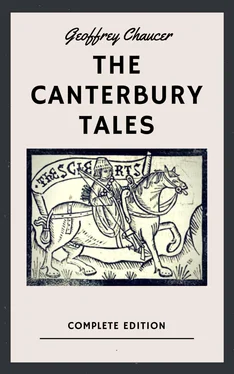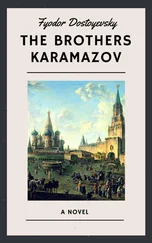1 ...7 8 9 11 12 13 ...49 An out-rider, that loved venery*; *hunting
A manly man, to be an abbot able.
Full many a dainty horse had he in stable:
And when he rode, men might his bridle hear
Jingeling <15> in a whistling wind as clear,
And eke as loud, as doth the chapel bell,
There as this lord was keeper of the cell.
The rule of Saint Maur and of Saint Benet, <16>
Because that it was old and somedeal strait
This ilke* monk let olde thinges pace, *same
And held after the newe world the trace.
He *gave not of the text a pulled hen,* *he cared nothing
That saith, that hunters be not holy men: for the text*
Ne that a monk, when he is cloisterless;
Is like to a fish that is waterless;
This is to say, a monk out of his cloister.
This ilke text held he not worth an oyster;
And I say his opinion was good.
Why should he study, and make himselfe wood* *mad <17>
Upon a book in cloister always pore,
Or swinken* with his handes, and labour, *toil
As Austin bid? how shall the world be served?
Let Austin have his swink to him reserved.
Therefore he was a prickasour* aright: *hard rider
Greyhounds he had as swift as fowl of flight;
Of pricking* and of hunting for the hare *riding
Was all his lust,* for no cost would he spare. *pleasure
I saw his sleeves *purfil'd at the hand *worked at the end with a
With gris,* and that the finest of the land. fur called "gris"*
And for to fasten his hood under his chin,
He had of gold y-wrought a curious pin;
A love-knot in the greater end there was.
His head was bald, and shone as any glass,
And eke his face, as it had been anoint;
He was a lord full fat and in good point;
His eyen steep,* and rolling in his head, *deep-set
That steamed as a furnace of a lead.
His bootes supple, his horse in great estate,
Now certainly he was a fair prelate;
He was not pale as a forpined* ghost; *wasted
A fat swan lov'd he best of any roast.
His palfrey was as brown as is a berry.
A FRIAR there was, a wanton and a merry,
A limitour <18>, a full solemne man.
In all the orders four is none that can* *knows
So much of dalliance and fair language.
He had y-made full many a marriage
Of younge women, at his owen cost.
Unto his order he was a noble post;
Full well belov'd, and familiar was he
With franklins *over all* in his country, *everywhere*
And eke with worthy women of the town:
For he had power of confession,
As said himselfe, more than a curate,
For of his order he was licentiate.
Full sweetely heard he confession,
And pleasant was his absolution.
He was an easy man to give penance,
*There as he wist to have a good pittance:* *where he know he would
For unto a poor order for to give get good payment*
Is signe that a man is well y-shrive.
For if he gave, he *durste make avant*, *dared to boast*
He wiste* that the man was repentant. *knew
For many a man so hard is of his heart,
He may not weep although him sore smart.
Therefore instead of weeping and prayeres,
Men must give silver to the poore freres.
His tippet was aye farsed* full of knives *stuffed
And pinnes, for to give to faire wives;
And certainly he had a merry note:
Well could he sing and playen *on a rote*; *from memory*
Of yeddings* he bare utterly the prize. *songs
His neck was white as is the fleur-de-lis.
Thereto he strong was as a champion,
And knew well the taverns in every town.
And every hosteler and gay tapstere,
Better than a lazar* or a beggere, *leper
For unto such a worthy man as he
Accordeth not, as by his faculty,
To have with such lazars acquaintance.
It is not honest, it may not advance,
As for to deale with no such pouraille*, *offal, refuse
But all with rich, and sellers of vitaille*. *victuals
And *ov'r all there as* profit should arise, *in every place where&
Courteous he was, and lowly of service;
There n'as no man nowhere so virtuous.
He was the beste beggar in all his house:
And gave a certain farme for the grant, <19>
None of his bretheren came in his haunt.
For though a widow hadde but one shoe,
So pleasant was his In Principio,<20>
Yet would he have a farthing ere he went;
His purchase was well better than his rent.
And rage he could and play as any whelp,
In lovedays <21>; there could he muchel* help. *greatly
For there was he not like a cloisterer,
With threadbare cope as is a poor scholer;
But he was like a master or a pope.
Of double worsted was his semicope*, *short cloak
That rounded was as a bell out of press.
Somewhat he lisped for his wantonness,
To make his English sweet upon his tongue;
And in his harping, when that he had sung,
His eyen* twinkled in his head aright, *eyes
As do the starres in a frosty night.
This worthy limitour <18> was call'd Huberd.
A MERCHANT was there with a forked beard,
In motley, and high on his horse he sat,
Upon his head a Flandrish beaver hat.
His bootes clasped fair and fetisly*. *neatly
His reasons aye spake he full solemnly,
Sounding alway th' increase of his winning.
He would the sea were kept <22> for any thing
Betwixte Middleburg and Orewell<23>
Well could he in exchange shieldes* sell *crown coins <24>
This worthy man full well his wit beset*; *employed
There wiste* no wight** that he was in debt, *knew **man
So *estately was he of governance* *so well he managed*
With his bargains, and with his chevisance*. *business contract
For sooth he was a worthy man withal,
But sooth to say, I n'ot* how men him call. *know not
A CLERK there was of Oxenford* also, *Oxford
That unto logic hadde long y-go*. *devoted himself
As leane was his horse as is a rake,
And he was not right fat, I undertake;
But looked hollow*, and thereto soberly**. *thin; **poorly
Full threadbare was his *overest courtepy*, *uppermost short cloak*
For he had gotten him yet no benefice,
Ne was not worldly, to have an office.
For him was lever* have at his bed's head *rather
Twenty bookes, clothed in black or red,
Of Aristotle, and his philosophy,
Than robes rich, or fiddle, or psalt'ry.
But all be that he was a philosopher,
Yet hadde he but little gold in coffer,
But all that he might of his friendes hent*, *obtain
On bookes and on learning he it spent,
And busily gan for the soules pray
Of them that gave him <25> wherewith to scholay* *study
Of study took he moste care and heed.
Not one word spake he more than was need;
And that was said in form and reverence,
And short and quick, and full of high sentence.
Sounding in moral virtue was his speech,
And gladly would he learn, and gladly teach.
A SERGEANT OF THE LAW, wary and wise,
That often had y-been at the Parvis, <26>
There was also, full rich of excellence.
Discreet he was, and of great reverence:
He seemed such, his wordes were so wise,
Justice he was full often in assize,
By patent, and by plein* commission; *full
For his science, and for his high renown,
Of fees and robes had he many one.
So great a purchaser was nowhere none.
All was fee simple to him, in effect
His purchasing might not be in suspect* *suspicion
Nowhere so busy a man as he there was
And yet he seemed busier than he was
In termes had he case' and doomes* all *judgements
Читать дальше












